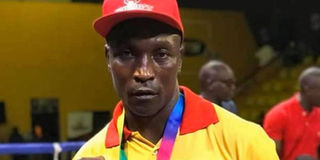Prime
How boxing passion painted Zebra’s portrait

Making his stripes. Zebra while representing the Bombers. PHOTO/AGENCIES.
What you need to know:
- Former Bombers captain Isaac ‘Zebra’ Ssenyange was gunned down outside his home in Bwaise, a Kampala suburb, on Wednesday morning in what President Museveni indicated – and apologised for – as the action of his security forces.
Isaac Zebra Ssenyange, who was killed in cold blood, in the early hours of Wednesday night near his home in Bwaise, was much a uniting and divisive figure. He hardly used fists or kicks but he would scare the hell out of everyone in an argument.
Bringing ghetto youths to the gyms
The peri-urban ghettos of Bwaise, near Kampala city, were known for high crime rate as unruly youths robbed and beat people as they puffed on drugs. Zebra, as he was known in sporting circles, grew up here and he was watching.
He thought and said this should stop. John Nakabale had just left the army in 1993, when he saw the teenage Zebra hustling. “He sold chapatti in the day, and trained boxing in the evening,” he recalled in an interview with SCORE.
“Then he begun taking the delinquents to the gyms, teaching them how to behave and use their energy in a way that does not endanger the society.”
Many reformed and some like Disan Mubiru have represented Uganda internationally. Some did not. But Abdullatif Ssekirime, LC I chairman St Francis Zone, says Zebra’s death spells disaster for Bwaise because “every youth feared and respected him.
His word to them was final. We don’t know how we were going to deal with them.” It’s almost everyone’s worry.
He did what Sadat Yiga does in the Nateete slums to attract the youth into kickboxing.
Zebra extended his influence by taking full control of Lukanga Boxing Club, and pooled many boxers more from other clubs, with a few incentives. This came at a cost, though, as other clubs hated Zebra for poaching their talents.
Bending rules
There was a time when a professional boxer or trainer was not allowed to second amateur or open boxers in Aiba competitions.
But the boxing federation applied this rule selectively. Zebra was a professional boxer but his amateur trainees from Lukanga and Zebra boxing clubs formed a big percentage of national events.
When Aiba relaxed the rules in 2015, to allow professional coaches into Aiba Competitions, “Once the coach has been certified by Aiba as a registered coach,” many in the boxing circles did not know.
They always faulted Zebra’s presence and influence in the amateur tournaments, citing the old law instead of demanding his Aiba certification.
Zebra used their ignorance of the law to bully them and often, he won.

This photo handout taken on an unspecified date, shared on deceased boxer Zebra Mando Ssenyange's social media platforms shows him in action during a boxing match at an unspecified venue. PHOTO/FILE/COURTESY/FACEBOOK VIA Zebra Mando Ssenyange.
Yelling at championships
It is against the Aiba rules to yell at or argue with the referees or match officials and repetitive offenders can be suspended from the competitions. Zebra habitually did this, but somehow, he survived suspension.
The worst chaos at a boxing event was at the 2015 national Open when fans broke the plastic chairs, swung salvos and attacked officials. Action was suspended.
It was triggered by a controversial decision in favour of UPDF’s Moses Mutaka and Kololo Boxing Club’s Ali Sserunkuma. Zebra was seen calming the situation, but there were allegations he was behind the chaos because he felt competition officials were favouring UPDF at the expense of other clubs including Zebra’s Lukanga.
No wonder, when sanity resumed two days later, Zebra convinced his boss Sam Lukanga to withdraw from the final in protest, as drew closer to victory. Lukanga boycotted local tournaments and even when they returned to Lugogo, Zebra and his boss were still the same passionate, confrontational pair.
Stood out to be counted
Zebra popped small his eyes out, stretched his huge muscles, moved up and down, and sweated from every pore to win an argument.
As the national team captain, Zebra once led a strike against poor facilitation in the camp in 2007. The administrators disbanded the camp and suspended him. He bounced back and led the team to the 2011 All-Africa Games in Maputo.
It was mainly boxing that took Zebra to the UK in the early 2000s, got him a place at New Addington Boxing Club in Croydon, and on the England Select team in a competition against Wales.
He, however spent six months at Belmarsh Prison in London on charges of rape. But he says the charges were fabricated by his rivals, who never wanted him to represent the Great Britain team.
When he was released, he returned home to lead the Bombers in several tournaments, including,…
It is boxing that gave him a wife – Mercy Mukankusi – a beautiful teenager, at Dynamic SS, who found ‘Zebra’ a weird name. Ironically, they hooked up and the rest is history. Did I tell you that the wife is also a certified boxing coach?
In 2017, Zebra seconded newcomer Moses Muhangi to knock Kenneth Gimugu out of Uganda Boxing Federation presidency. Since then, he was Muhangi’s shield and the boss assigned him as of general duties and manager of the Bombers.
Zebra’s influence in the federation, took the 2018 National Intermediates Championship to the ghetto. First, in Bwaise, then in Katwe.
Zebra never boxed at the Olympics. He never won prestigious medals like Godfrey Nyakana, Juuko, or Lubega. His pro career never reached the US, the mecca of boxing like John ‘the Beast’ Mugabi or Kassim Ouma. But his legacy as a passionate boxer, trainer and leader, fits him just among those great names.
That’s the Zebra legacy.
[email protected]




